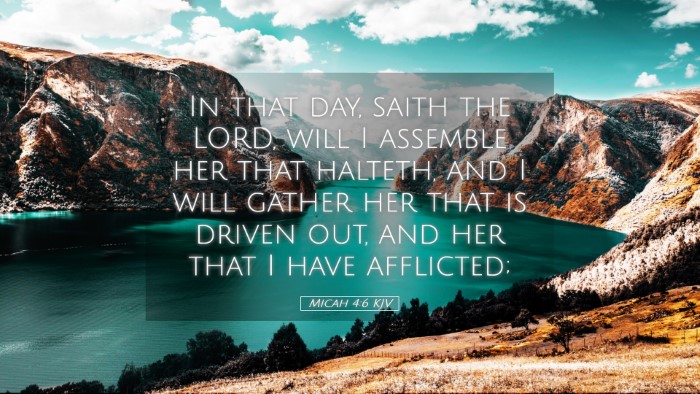Old Testament
Genesis Exodus Leviticus Numbers Deuteronomy Joshua Judges Ruth 1 Samuel 2 Samuel 1 Kings 2 Kings 1 Chronicles 2 Chronicles Ezra Nehemiah Esther Job Psalms Proverbs Ecclesiastes Song of Solomon Isaiah Jeremiah Lamentations Ezekiel Daniel Hosea Joel Amos Obadiah Jonah Micah Nahum Habakkuk Zephaniah Haggai Zechariah MalachiMicah 4:6
Micah 4:6 KJV
In that day, saith the LORD, will I assemble her that halteth, and I will gather her that is driven out, and her that I have afflicted;
Micah 4:6 Bible Commentary
Commentary on Micah 4:6
Verse Text: "In that day, saith the Lord, will I assemble her that halteth, and I will gather her that is driven out, and her that I have afflicted."
Introduction
Micah 4:6 stands as a beacon of hope amidst judgment, encapsulating God's promise to His people. The verse illustrates God's commitment to restore those who have been marginalized, oppressed, and afflicted. Drawing from a rich tapestry of public domain commentaries, including insights from Matthew Henry, Albert Barnes, and Adam Clarke, we delve into the multifaceted meanings and implications of this verse.
Historical Context
The Book of Micah, written during a turbulent period in Israel's history, addresses both the sins of Israel and the hope of future restoration. This prophetic message is directed primarily at both Jerusalem and Samaria, highlighting the consequences of Israel's unfaithfulness to God and the ensuing exile.
Divine Assembly
Micah speaks of a day when the Lord will "assemble" those who "halt" or are limping due to their past afflictions. This gathering reflects God's sovereignty and His ability to bring together a people who have been scattered.
- Matthew Henry: Henry suggests that the assembly is not solely geographical but spiritual, indicating that God’s people will be unified in their worship and service.
- Albert Barnes: Barnes emphasizes that this assembly signifies God's care for the helpless and His intent to restore all who have suffered injustices.
- Adam Clarke: Clarke illustrates the gathering as a sign of divine compassion, characterizing the people as those who have been ignored or pushed aside in society.
The Afflicted and the Outcasts
The reference to those "driven out" and "afflicted" indicates the marginalized in society. Micah proclaims that God has not forgotten those who have been wronged.
- Matthew Henry: He notes that God's gathering includes those who have been wronged by society but are still precious in God's sight.
- Albert Barnes: Barnes adds that God’s response to suffering is active; He does not passively witness affliction but intervenes, seeking to restore justice.
- Adam Clarke: Clarke draws attention to God's active role as the restorer, contrasting the world's tendency to overlook the marginalized.
Theological Implications
Micah 4:6 presents several theological implications concerning God's character and the nature of His kingdom.
- Divine Justice: God is portrayed as a just entity who desires to rectify the wrongs inflicted upon His people. He actively seeks to restore balance in the lives of those wronged.
- God's Sovereignty: The gathering is a testament to God's sovereign authority over history. The acknowledgment that He assembles His people conveys His deliberate action and control over the unfolding of events.
- Hope and Restoration: Ultimately, the verse brings forth the hope of restoration. God's intent to gather the afflicted is a profound message of hope for a future where healing occurs.
Application for Today
For pastors, theologians, and students alike, Micah 4:6 serves as a reminder of God's continual engagement with the marginalized in today's society. This verse encompasses not only a historical promise but also an ongoing covenant with all who suffer.
- Emphasis on Compassion: The call to action is clear; believers are encouraged to reflect God's compassionate nature in their communities by advocating for justice and mercy.
- Community Restoration: The church today is charged with the responsibility of being a sanctuary for those who feel outcast, allowing the truth of God’s gathering to manifest within its walls.
- Encouragement for the Afflicted: For those who find themselves in times of suffering, this verse serves as a promise that God sees their plight and actively seeks to restore them.
Conclusion
Micah 4:6 encapsulates a profound truth that transcends time and context—God's ever-watchful eye upon the afflicted and His unwavering commitment to restoration. It encourages a holistic view of God’s nature, inviting believers to participate in the divine act of caring for and gathering those who have been marginalized. Through the insights garnered from various commentaries, we gain a deeper understanding of the heart of God as a compassionate and restorative force in our world.


